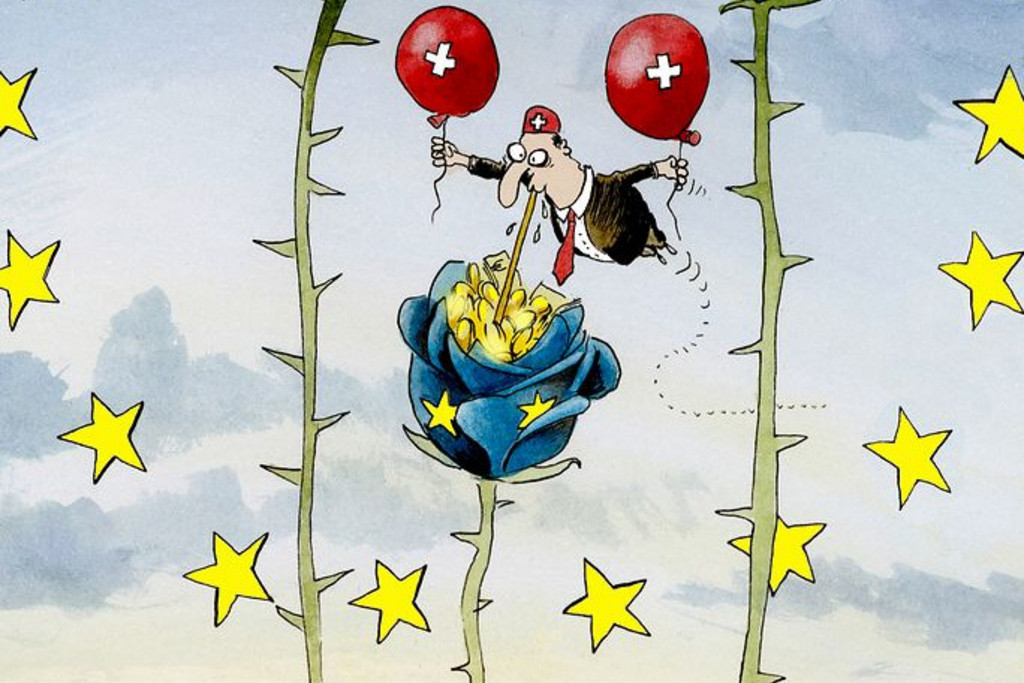The most sensitive issue is marrying Swiss sovereignty with the role of the European Court of Justice. The current draft agreement allows for an independent arbitration panel to mediate between Berne and Brussels in the event of differences. However, where questions of EU law are concerned, which would be the case with most issues under contention, the panel would be bound by rulings from the Court of Justice.
CVP president Gerhard Pfister sees the role of the European Court of Justice in relation to the framework agreement as “toxic”. It is not acceptable to have a “unilaterally European court deciding on matters arising from the relationship between the EU and a non-EU member state”, argued Pfister in a newspaper interview. The centrist politician is particularly concerned that the Court of Justice could force Switzerland to adopt the Citizens’ Rights Directive, which would make it easier for EU citizens to access welfare benefits in Switzerland. However, the Directive is not explicitly mentioned in the framework agreement.
Employee organisations oppose the agreement because of concerns over wage protection. They want Switzerland to be able to protect itself from wage dumping – as is currently the case through the accompanying measures. The Trade Union Federation is also sceptical of the European Court of Justice, whose rulings in recent years have weakened collective labour law, e.g. in relation to collective labour agreements and the right to strike.
The Federal Council wants to renegotiate
Only the Green Liberals, the BDP and the FDP – of which Federal Councillor and foreign minister Ignazio Cassis is a member – approve of the framework agreement. However, support from the Liberals is also starting to wane. Former FDP Federal Councillor Johann Schneider-Ammann recently spoke out against a loss of sovereignty in an interview with the “Neue Zürcher Zeitung”. The balance between national sovereignty and access to the EU internal market has been overlooked in the draft framework agreement, “to Switzerland’s detriment”, argues the former economics minister. The “de facto subordination” of the arbitration panel to the European Court of Justice would be a step too far.
The government has already indicated that it intends to hold further negotiations with the EU regarding the “unresolved issues”, including the Citizens’ Rights Directive and wage protection. The Federal Council nominated a new chief negotiator in mid-October. State secretary Livia Leu, the former Swiss ambassador in Paris, is already the fifth leading diplomat to take over the complex EU dossier. The Federal Council hopes that she will add fresh impetus to break the current impasse. At the time of going to press, the negotiation parameters on the Swiss side had yet to be defined.
Growing impatience in Brussels
Brussels is becoming increasingly confused by Switzerland’s wavering. Following the outcome of the referendum, the EU had assumed there were no more obstacles to signing what was, at least from the Brussels perspective, a fully negotiated framework agreement. On the day of the referendum, European Commission President Ursula von der Leyen stressed that, while the EU was prepared to work on “clarifications”, it also expected the Federal Council to move “swiftly” towards ratifying the agreement. Nonetheless, it is possible that backroom dealings are still ongoing to help the Federal Council make the agreement acceptable to the majority. After a parliamentary vote, the final word will lie with the people.






![[Translate to English:]](/fileadmin/_processed_/3/7/csm_max-spring-3-cartoons-de_3c29839370.png)









Comments
Comments :
Sie sollte für sich selbst von der Schweiz lernen, über wie viele Jahre wir gebraucht haben und zusammen gewachsen sind, zu dem was wir heute sind.
Die Schweiz als Solche ist auch nach 729 Jahren noch nicht in Ihrer Entwicklung fertig. Man erinnere sich an die Vorzeit der Gründung des Kantons Jura mit Brandschatzung, Bomben und Terror oder an den noch bestehenden "Röstigraben".
Das ist die Vielfältigkeit, der 4 Landesteile mit ihren Sprachen und Kulturen.
729 Jahre haben dazu gebraucht und entwickeln uns noch immer weiter.
70 Jahre EU können da nicht mithalten, mit den noch grösseren Unterschieden von Staaten und Kulturen, nebst deren Sprachenvielfalt.
Aber als Nachahmer-Modell so denke ich, taugt die Schweiz dafür schon. Wir sind dafür weltweit anerkannt, werden bewundert, wie Föderalismus mit Frieden und Wohlstand funktioniert.
Abschliessend: Schon jedes grosse Reich hat früher oder später seinen Niedergang gefunden. Seien es das römische, osmanische, sowjetische, oder auch das deutsche Reich gewesen. Sie Alle und viele Andere existieren schon längst nicht mehr.
Schon John F. Kennedy sagte: Fragt nicht was der Staat für Euch tun kann. Fragt Euch, was Ihr ( Volkeswille ) für den Staat tun könnt.
Gut, daß Sie bestimmen wollen wie die Schweizer denken. Eins sei Ihnen gesagt: In Deutschland wird heute bestimmt wie die Leute zu denken haben - ansonsten folgt der gesellschaftliche Ausschluss, bis zum Jobverlust und in den Ruin hinein. In der Schweiz zum Glück noch nicht ! Am Besten wäre es wenn das so bleibt - ganz sicher.
Hier eine Textzeile aus einem Song von mir, den ich schrieb, als Deutschland mal wieder eine undemokratische (Demokratie dort ist kein Witz, sondern eine traurige Utopie) Machtausübung gegenüber der Schweiz durchzog, schwadronierte und drohte:
'D'Schwiiz diä isch keis Bundesland - wäg mit de dütschä Machtgierhand!'
Doris Thut, München
Die Schweiz ist immer gut gefahren, so lange sie über ihr eigenes Wohl selbst bestimmen konnte. Wir brauchen kein Brüsseler Gericht, das uns sagt ,was wir tun oder nicht tun können!
Die Schweizer stimmen ab, und stimmen ab, und stimmen ab, das Resultat ist das selbe! Wir wollen nicht der EU beitreten und wir wollen nicht von der EU befürwortet werden! Wann begreift das unsere Regierung? Ohhh... ja, in Brüssel sind sie "enttaäscht"!! - - So??-- Warum so einen grossen Drang, die kleine Schweiz zu "integrieren"? Warum ist es nicht möglich, dass wir alle in Frieden miteinander leben können ohne dass Druck von Bruessel ausgeübt wird? Warum müssen wir unsere Schweizer Identität und Demokratie verlieren? Um die EU Regierung zu befriedigen? - - Der Rausch der Macht !!
Warum ist es nicht möglich selbständig zu sein und mit Respekt behandelt zu werden?
In my view, the EU is clearly led by one country only: France. Germany is just an appreciated appendix when it comes to footing the bill for all the mistakes France and its affiliates Italy and Spain, make. Who put into place the new Head of the ECB, despite no relevant experience in monetary theory or practice? Macron. Who put into place the new Head of the EU Commission, pouring ridicule upon an election process in which over 350 m people were asked to cast their vote, by overturning the popular vote for the candidate Manfred Weber? Macron. Who is blocking the BREXIT negotiations? Barnier on behalf of Macron (and that mainly to keep the French fishers whole and have them continue poaching in UK waters). That is worrying for me. France has no model for the future of Europe, nor do Italy or Spain, and therefore, the Covid crisis will precipitate the inexorable decline of Europe... It makes me very sorry, as I'm a European at heart...
Unfortunatly swiss policies are many times a blind copy of french rules, why is it so ? Follow the money in our 2nd pilar banks's system ... Or Davos meetings shelter for the lobbies. As a retired swiss expat in France for economic reasons because Switzerland has become so and too costly for even simple life just with only the budget fees for a simple medical insurance and a simple rent for a studio, that I can't afford. But I don't complain, this is my only freedom to again be an expat some where else in the world, if politics of macronism are not totally changed, because it's the worst nightmare every daytime for liberty ! So please, our government should, must be strong and more protecting for its citizen rather than being half for swiss people and half for EU supremacy, this is just the way to lose on both sides pictures ... French people voted fews years ago for frenchxit but it has been puted on garbage. We have got several strong and powerful cards in this chess game to say NO to Bruxelles, negociating is an art and the key is to be real strategic and play with other countries as allies with the same interests before its too late. Use the same tricks to reverse the situation's power, be united and wise in our governtment. We have got exemples of small countries whom could say NO to geant as USA for their supremacy, this is a state of mind first and a state of determination, so let's do it ! And all the best to Livia Leu to be the weapon of our government, we have so many talents like our Carla Del Ponte, why to be weak ?!
Warum ist denn z.B. um den Zürichsee herum seit einigen Jahren alles derart verbaut? Weil es in der EU so toll ist? Garantiert nicht!
Die EZB ist das nächste Pferd, was bald nicht mehr kann - weil das verwendete Heu schon lange keinen Wert mehr darstellt.
Union is always stronger as division.
This fundamental and ethical principle shall not be forgotten. Keeping our minds open to being united ultimately improves quality of life for us all.
Je suis un peu surpris que l'on parle d'empire européen, de la part d'une brexiteuse. Comparer à l'Angleterre, je ne vois pas d'empire européen. Contrairement à presque toutes les nations unionistes, il y a la pluralité des langues, des confessions, des opinions. À mon avis, la chose principale qui manque à l'Europe est de sortir du confédéralisme pour entrer dans le fédéralisme.
Elle s'y engage lentement, abolition des frontières, essais de monnaie unique, harmonisation de l'enseignement. Je pense que le modèle de la Suisse pourrait s'appliquer à l'Europe. Poste, monnaie, armée, douane etc communs.